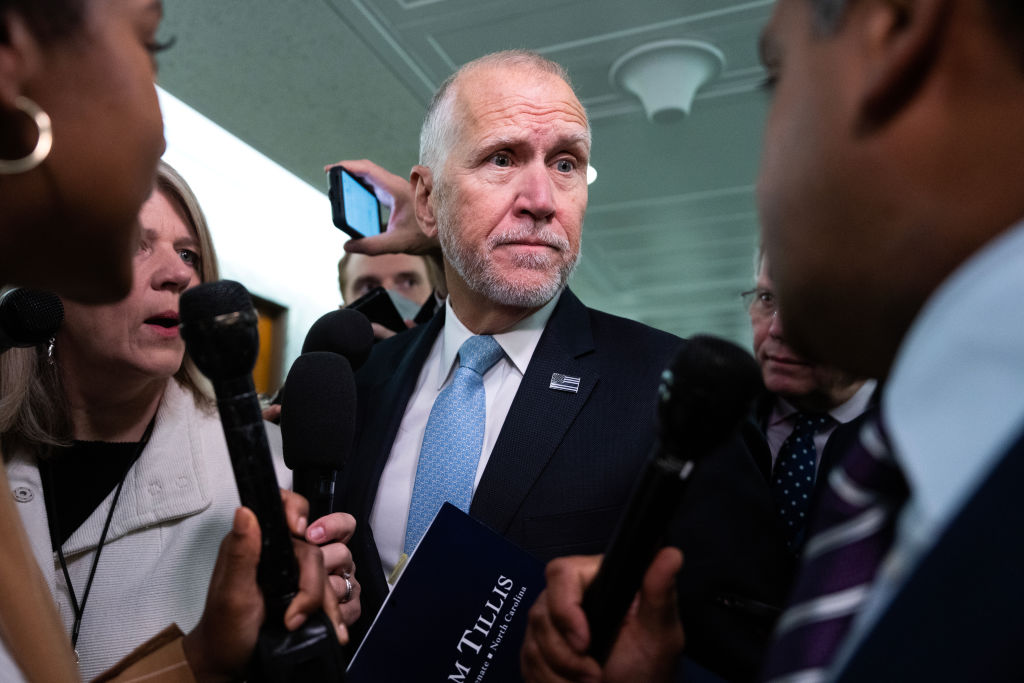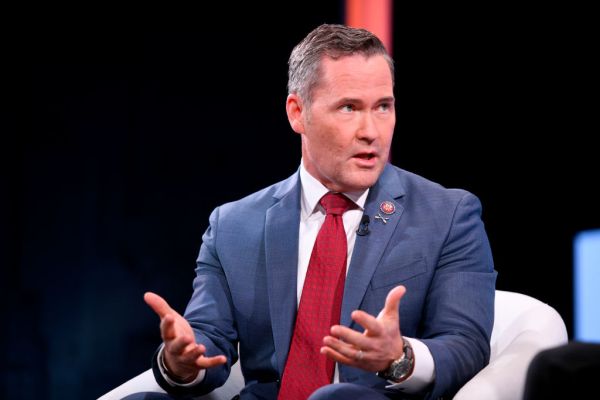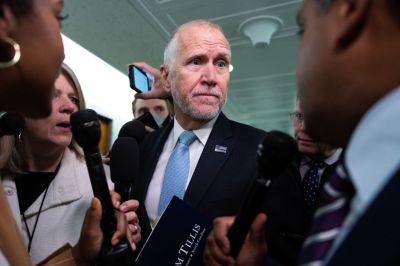With the 2024 cycle barely in the rearview mirror, some congressional Republicans know they already need to strategize how to simultaneously please Donald Trump and win their next election, hopefully while avoiding a primary challenge.
Trump’s influence among Republican voters is as strong as ever, and he did not wait to test how far Republicans would go to placate him, nominating former Rep. Matt Gaetz as his attorney general. But the president-elect found Senate Republicans had a limit, and Gaetz—plagued by a generally controversial reputation and allegations of sexual misconduct—was beyond it.
Now, Republicans face a new loyalty test. Over the weekend, Trump announced Kash Patel as his choice to lead the FBI, thereby ousting current FBI Director Christopher Wray, whom Trump appointed in 2017.
Patel is a close Trump ally who has indicated he would use the bureau to investigate Trump’s perceived enemies. In an interview with Steve Bannon last year, Patel said he would “come after the people in the media who lied about American citizens who helped Joe Biden rig presidential elections,” whether “criminally or civilly.” Patel’s 2023 book, Government Gangsters, also contains a list of “members of the executive branch deep state” that includes President Joe Biden, other Democrats, and Republicans who have opposed Trump. Speaking on a YouTube show in September, Patel suggested he would turn the FBI headquarters in Washington, D.C., into a “museum of the deep state” and disperse its 7,000 employees across the country “to chase down criminals.”
Some Republican senators will need to make a difficult decision. Do they back Patel and risk upsetting their constituents in the general election, or do they try to block him and risk incurring Trump’s wrath?
Vulnerable officeholders usually attempt to cultivate a more centrist reputation, which leaves them open to a primary challenge from the right. One senator in a difficult position on that front is Thom Tillis of North Carolina, who represents a state in which both Democrats and Republicans have won statewide, often in the same election. At the same time, the two-term senator, who is up for reelection in 2026, will not want to displease Trump—who could endorse a copartisan challenger and make things difficult in the primary—by opposing Patel’s confirmation. Tillis’ office on Wednesday said he was “working on making sure [new attorney general nominee] Pam Bondi and Kash Patel get through the Senate Judiciary Committee and get confirmed on the floor,” vowing to support any nominee who makes it out of a Senate committee. Tillis sits on the Judiciary Committee before which Patel will have to testify.
But even members of the House of Representatives will need to make a similar calculation. Rep. Mike Lawler of New York—a moderate who won a second term by 7 points, or 25,000 votes, in a race that many observers assumed would be much closer—has not closed the door on a gubernatorial run against Gov. Kathy Hochul in 2026. He would need to win a primary in a state Republican Party whose members are fond of Trump, whom Lawler has criticized in the past.
So he took some by surprise when he spoke approvingly of Patel’s nomination on CNN’s State of the Union Sunday. “Donald Trump campaigned on reforming the FBI and the Department of Justice, so I don't know why any of this is, frankly, surprising to people,” Lawler told anchor Kasie Hunt. “President Trump has nominated, in Kash Patel, someone who served as chief of staff at the Department of Defense … someone who served as a senior staffer on the House Intelligence Committee.” Lawler added that Americans were “not interested in a revenge tour” but said he had no reservations about Patel serving in the role.
However, other House Republicans who spoke to The Dispatch on Capitol Hill on Wednesday took a different tone. None condemned Patel, but few seemed excited about the prospect of him leading the FBI.
Rep. Don Bacon, a retired Air Force general, won a fifth term last month in a Nebraska district that Vice President Kamala Harris carried by more than 4.5 points. Though he is rather conservative ideologically, he has not hesitated to clash with Trump and some of his allies in Congress. Trump publicly called for a primary challenge against Bacon in the 2022 cycle, though no formidable opponent joined the fray. Bacon did, however, face a primary challenge this year, winning by 24 points. In an interview with The Dispatch, he indicated he had reservations but was keeping an open mind on Patel.
“I worry at times about overreach on some of the stuff, but let’s hear what he has to say in the Senate,” Bacon said in response to a question about some of Patel’s past statements. He said he’d had lunch with Patel one time but did not know him well. “I’ll give him the benefit of the doubt. Let’s listen to what he has to say in the Senate,” Bacon said.
Rep. Juan Ciscomani of Arizona, who just won a second term in a swing district by fewer than 11,000 votes, or 2.5 points, also deferred to Patel’s forthcoming vetting by the Senate. “I don’t know what he’s going to do,” he said. “We need to wait for the process to play out, for the senators to ask the questions, and all that will come out.”
On the other hand, some congressmen who, like Ciscomani, skew toward the center of the political spectrum tried to avoid commenting on Patel entirely.
“This is over to the president to make the nominations, not me,” said Rep. Zach Nunn of Iowa, who recently won a second term by 3.5 points. “You’ll get more out of the Judiciary Committee. This is not my area.”
Rep. David Schweikert of Arizona, who won by a similar margin to Nunn, also tried to steer the conversation away from the controversial nominee, saying he knew “almost nothing about” Patel. “I do taxes and Medicare financing,” he said. “Did you have a Medicare finance question?”
Rep. Mariannette Miller-Meeks of Iowa praised Patel but was not effusive. “He seems to be qualified, and he certainly has called out the weaponization of the FBI,” she said.
Miller-Meeks, who has been rated more conservative than most House Republicans but does not have a far-right reputation, pulled off a victory of fewer than 1,000 votes against her Democratic opponent—after she defeated by 12 points a primary challenger who put up a stronger than expected showing after attacking her from the right.







Please note that we at The Dispatch hold ourselves, our work, and our commenters to a higher standard than other places on the internet. We welcome comments that foster genuine debate or discussion—including comments critical of us or our work—but responses that include ad hominem attacks on fellow Dispatch members or are intended to stoke fear and anger may be moderated.
With your membership, you only have the ability to comment on The Morning Dispatch articles. Consider upgrading to join the conversation everywhere.